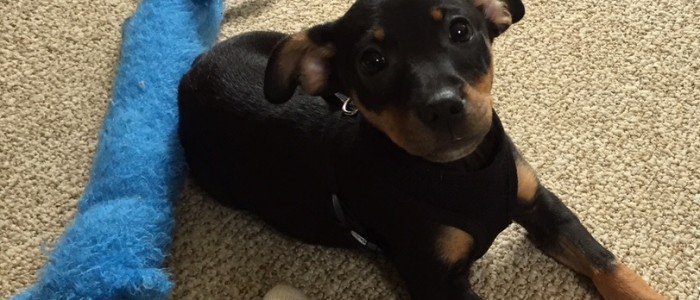This spring our doctors and nurses treated two young puppies with a very serious condition, Canine Parvovirus. Canine Parvovirus is a highly contagious virus that can be contracted by all dogs but unvaccinated dogs or puppies under four months of age are most at risk. It is common to hear that dogs that suffer from this virus have “parvo”. The virus is spread by direct contact with infected dogs or contact with infected stool, environments or people. The virus can contaminate kennel surfaces, food and water bowls, collars and leashes, bedding and even the hands and clothing of people handling the infected dogs.
The symptoms of parvovirus infection include lethargy, loss of appetite, vomiting, diarrhea (often severe and bloody) and fever. Vomiting and diarrhea can quickly cause dehydration, especially in young puppies. If untreated, parvovirus can be fatal within 48 to 72 hours.
While the infected puppies were being treated here at Unity, they were housed in our isolation unit and every precaution was taken to contain the infection. There is no specific drug available to treat parvovirus. The treatment consists of supportive measures to control the dangerous symptoms. Infected patients are treated with fluids to combat dehydration and medications to control vomiting, diarrhea and pain. Treatment is often very intensive and costly; however, parvovirus is easily and inexpensively prevented with proper vaccination.
The best way to prevent parvovirus infection is through good hygiene and vaccination. Make sure that puppies are vaccinated as soon as possible and that adult dogs are kept up to date on their parvovirus vaccination (which is usually included in combination distemper vaccinations). Until your new puppy has completed his series of vaccinations, you should be cautious about bringing him to places where he will be exposed to other young puppies or dogs with unknown vaccination status.
As a result of the attentive care of our doctors and nurses, we are very happy to report that both of the puppies we treated recovered and are now bouncing balls of energy. We hope that you never have to deal with this virus in your own dogs but remember that quick treatment is key to recovery.
Interested in learning more about parvo? Visit http://www.veterinarypartner.com/Content.plx?P=A&S=0&C=0&A=1199


Comments are closed.